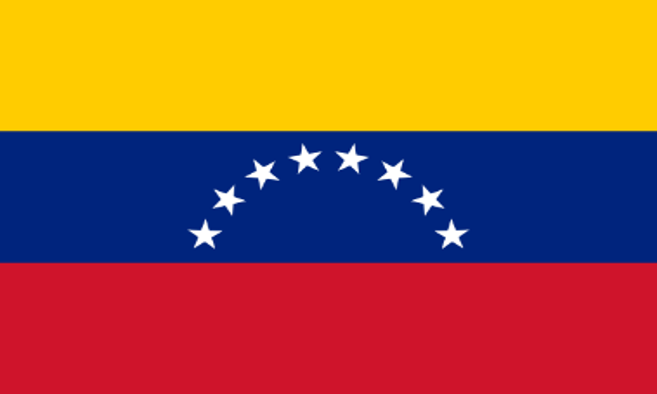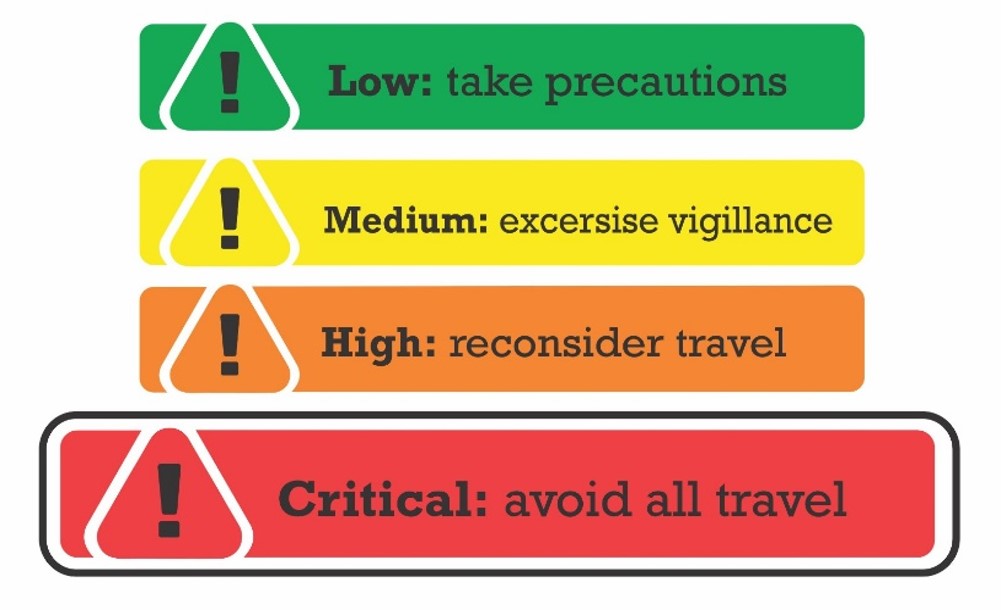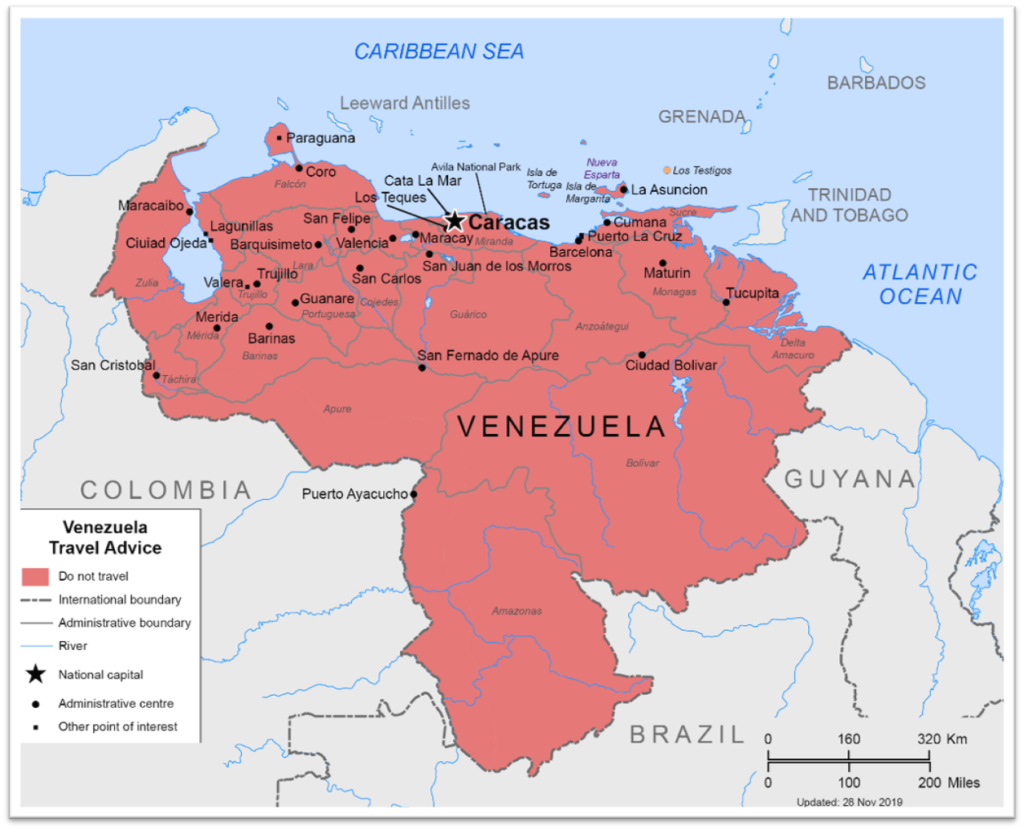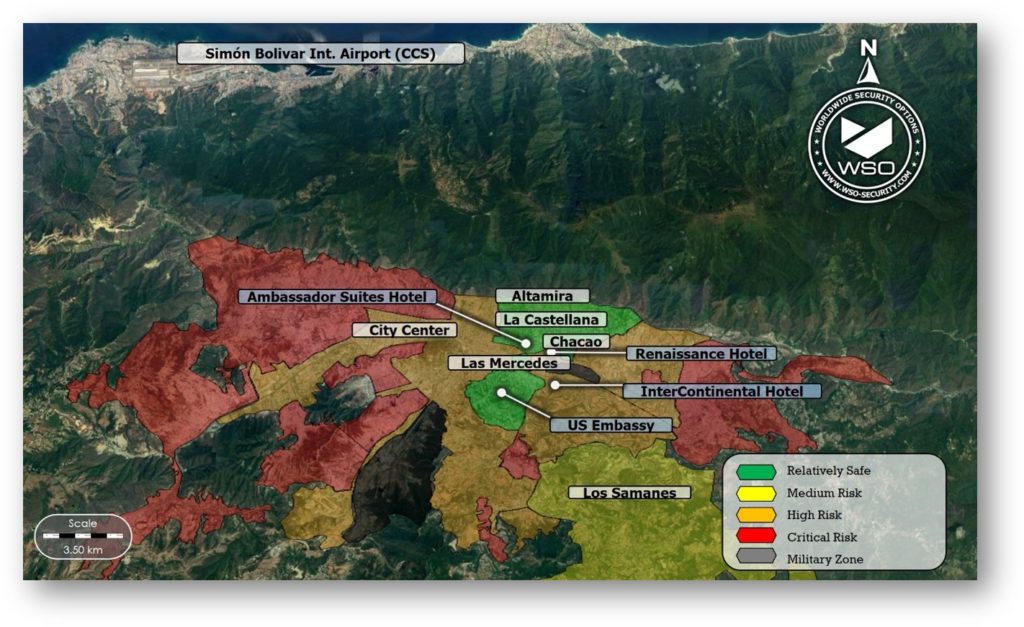| Official Name | Bolivarian Republic of Venezuela |
| Official Language: | Spanish |
| Area: | 916,445 km2 (353,841 sq mi) |
| Population: | 28,887,118 |
| Time Zone: | UTC−4 |
| Capital City: | Caracas |
| Height (Quito): | 900 m (3,000 ft) |
| Currency: | Bolívar (VES) |
| Main Cities: | Caracas, Maracaibo, Valencia |
| Main Port: | Port of Cabello (Carabobo) |
| Required vaccination for entry: | None |
| Nationals requiring VISA for entry: | US, Canada, Chile, Peru, Panama, Honduras, El Salvador, Guatemala |

Main Risks:
Political instability, theft, robbery, kidnapping, extortion, rape, drug and human trafficking, fraud, vehicle assault, unruly demonstrations.
Executive Summary
Venezuela features critical risks chiefly associated with political instability in the country and the possibility of suffering armed robbery at the hands of common criminals or organized gangs. Given the deteriorating scenario, we advise against non-essential travel to Venezuela. Avoid all road travel throughout the countryside. In Caracas, it is recommended to avoid travel through remote neighborhoods and remain within the vicinity of central districts featuring reputable hotels. Avoid areas where all kinds of demonstrations unfold. Regardless of the purpose of travel, we advise procuring private transportation or executive protection services, especially if business or high-profile itineraries are involved.

General Risk Level: CRITICAL.
The risk remains critical across the country. All travel to countryside areas beyond important urban areas must be completely avoided. In any case, any trip to Venezuela must be planned in advance bearing in mind the deteriorating security situation.

Crime and Security
Venezuela has one of the highest crime rates in Latin America. Low and medium-level crime represents one of the main threats to travelers visiting Venezuela. The risk of suffering robbery is high throughout the country, even in urban areas and in the capital of Caracas. There is also a distinct risk of suffering short-term “express” kidnapping. Whether planned or committed at random, criminals seek to force their victims to extract cash from ATMs before being released. Moreover, criminals often operate in motorbikes to assault vehicles during the recurrent traffic jams near or along the main thoroughfares in the capital. Foreigners and locals alike are liable to be targeted.
Although the legal tender is the Bolivar (VES), as a result of the worsening economic crisis and hyperinflation, the American dollar (USD) is increasingly being used as de facto currency for everyday transactions. For this reason, and given the perceivable high purchase power attached to the USD, foreigners may become attractive targets for criminals.
Political rallies and protests in Venezuela are commonplace and generally devolve into violence. In Caracas, antigovernment protesters often block transit along the main thoroughfares. In turn, the Government usually appeals to pro-regime civil militias (locally known as “colectivos”) to counter the opposing demonstrators, leading to clashes between activists from both sides. Additionally, security forces are known to resort to deadly violence to forcefully disperse anti-government demonstrators. It is thus recommended to avoid areas where protests are unfolding. Even peaceful demonstrations can rapidly turn violent with little or no warning.
Political risk in Venezuela is critical. The possibility of a military uprising or some kind of armed rebellion against the Government cannot be ruled out, even in Caracas. In light of this risk, we advise planning for contingency options before travel takes place in order to promptly evacuate the country in case of escalating conflict. The risk posed by organized crime is especially high in the bordering areas with Colombia and Brazil, where elements tied to the Armed Revolutionary Forces of Colombia (FARC) and the National Liberation Army (ELN) operate. The risk of suffering crimes and kidnap is critical in these areas.
Security in Caracas
In general, the safest districts are located in the center of the city. Please be advised that the local expression for “neighborhood” (“barrios”) refers to shanty towns in the city’s hills and mountainous areas. Zones recommended for lodging, travel, and conducting business and transactions are Altamira, La Castellana, Chacao and Las Mercedes (Central Business District – CBD). Notwithstanding the overall critical security situation, these areas are perceivably safer than others because they feature high-income residential buildings, Western embassies, and prominent hotels. That said, it is recommended to exercise constant vigilance. Even the most privileged sites can witness violent crimes. The Simón Bolívar International Airport (CSS) serving Caracas is located in Maiquetía, in the northeast of the capital. The trip between the airport and the commercial district in Las Mercedes should take approximately 60 minutes depending on traffic. Note however that vehicular congestion is commonplace, so we recommend anticipating disruptions and delays.
In Venezuela, power cuts are expected and may last for a significant number of hours. Although the largest hotels have their own power generators for emergency cases, it is recommended to have contingency plans to anticipate this scenario. For security reasons, procure sufficient provisions in advance to avoid having to leave the premises of the hotel.

Transportation
For security reasons, we do not recommend using public transportation services in Venezuela under any circumstances. Given the critical risk levels, we recommend procuring reputable private transportation services before travel takes place. We advise hiring a trustworthy designated driver for the entire duration of the trip. Preferably, the driver should have qualified training in performing security maneuvers. If these services are unavailable, it is paramount to use private taxis, but only as a last resort. Do not use taxis other than the ones specifically recommended by the staff from the largest hotels lodging foreign nationals. If high-profile itineraries are involved, it is necessary to procure reputable executive protection services for the whole duration of the trip.
For intercity trips, we recommend taking commercial flights. Due to the delicate security situation, all road travel to the countryside is strongly advised against, whether by day or night. If the itinerary requires road travel, it is of utmost importance to plan the route in advance and under the direct supervision of reputable security professionals. Their assessments will identify the safest and most convenient route to mitigate potential risks.
Health and Sanitary Conditions
Venezuela features changing temperatures and travelers should pay attention to meteorological conditions and avoid touristic trips during the rainy season.
While no proof of vaccination is required for entry into the country, it is recommended to have the following vaccines before traveling: yellow fever, tetanus, hepatitis A and B, and typhoid. It is also necessary to wear protection against bugs and avoid leaving body areas uncovered so as to mitigate the risk of suffering mosquito-borne diseases. While we advise against venturing into remote locations outside Caracas or the main cities, these precautions must be followed while entering remote and jungle areas. Although the quality of tap water in Venezuela has generally worsened as a result of deteriorating sanitary conditions, the main districts in Caracas are still well supplied.
It is not advised to travel without international health insurance covering emergency medical evacuation to the country of origin.
Take essential health precautions to mitigate the risk of contracting diseases or viruses. Carry masks in crowded places such as airports and maintain rules of social distance and avoid contact with surfaces of common use in public places. Always carry hand sanitizer.
Tactical Recommendations
Avoid all non-essential travel to Venezuela. Avoid all travel to countryside localities beyond the largest cities. Plan the trip in advance under the supervision of reputable security professionals.
Exercise vigilance and situational awareness throughout the duration of the trip to Venezuela. While some urban areas are safer than others, no area is spared from trends in low and medium level crime. Avoid venturing beyond the safest neighborhoods and lodge in one of the most reputable hotels in the vicinity of the Chacao and Las Mercedes districts. We advise against traveling through Caracas by night under any normal circumstances.
We recommend hiring private transportation services for the duration of the trip to Venezuela. If business or high-profile itineraries are involved, we also recommend procuring executive protection services.
We advise planning contingency options under the supervision of reputable security professionals for a prompt evacuation in case of emergency or civil strife in the country.
US, Canadian, and European nationals from EU countries are advised to notify their respective embassies before traveling to Venezuela.
Avoid carrying large sums of cash or valuables during the trip. We advise against wearing or carrying items in public that may give the impression of economic affluence and which could attract unwanted attention from criminals.
Avoid traveling through the country in sport or luxurious cars which could attract unwanted attention from criminals and corrupt police officers.
Do not resist armed robbery attempts. We recommend to always carry a few USD bills for duress cases, specifically to appease criminals looking for easy money.
Avoid the vicinity of every kind of political demonstration or rally in urban areas. Peaceful demonstrations are liable to be infiltrated by violent elements. Furthermore, protesters are often dispersed forcefully by security forces.
Bear in mind that traffic jams are recurrent in Caracas, and these could potentially affect travel itineraries and security. We advise you to anticipate these disruptions and to allow extra time for such contingencies.
Remain cognizant that power cuts are likely to take place across urban areas and may potentially last for several hours. We advise taking every necessary precaution to procure sufficient supplies without having to leave the vicinity of the hotel. Take all necessary precautions to mitigate the risk posed by mosquito-borne diseases and procure international medical insurance covering emergency evacuation to the country of origin.
Emergency Contacts
Police: 911
Ambulance: 911
Fire: 911
WSO Global Command Center: +1 956 467 4858 / gcc@wso-security.com
Security advice and assistance over WhatsApp: +593 99 461 1128 / +521 81 1511 3166



